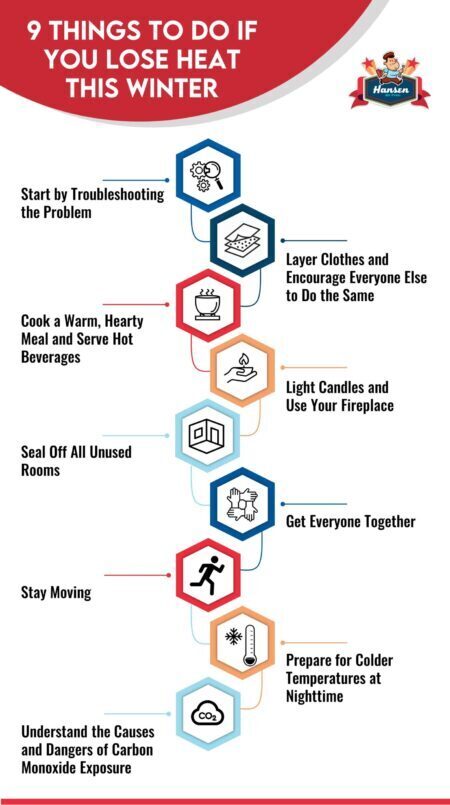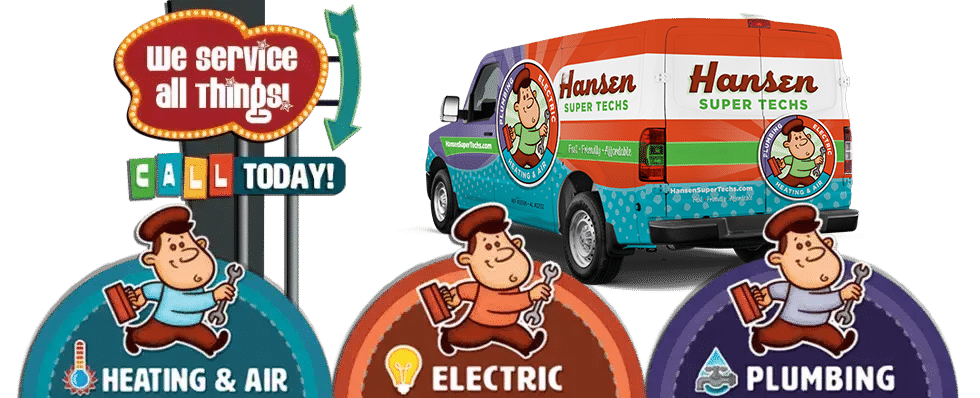9 Things to Do If You Lose Heat This Winter
Losing heat in your Theodore, Alabama, home during winter can be both uncomfortable and dangerous. The good news is that there are plenty of ways to avoid temperature-related health issues like hypothermia while you wait for HVAC technicians to arrive. With the nine tips that follow, you can keep everyone safe and warm until the heat comes back on.
1. Start by Troubleshooting the Problem
There’s no point in sitting in the cold if you don’t have to. Take a minute to find out whether your heating issue is a minor one that you can resolve on your own. Start by checking the temperature setting at your thermostat and by verifying that the thermostat is powered on. You may be able to get the heater back on by changing the thermostat batteries or by adjusting the thermostat setting. If this doesn’t work, check your furnace setting. It should be set to “HEAT.” If it isn’t, turn the setting to “HEAT” and then wait to see if the furnace starts working. You should also check for:
- Blown fuses at the electrical panel
- A tripped circuit breaker
- An unlit pilot light
If your pilot light is out, follow the furnace manufacturer’s steps for relighting it. If it won’t stay lit after several attempts, call Hansen Super Techs for service. Although there are many reasons why heaters stop working, most of these issues require professional attention.
2. Layer Clothes and Encourage Everyone Else to Do the Same
Wearing multiple layers of clothing is one of the best ways to stay warm when the heating system is down. Layer sweaters over shirts and encourage everyone to put leggings or thermals on under their pants. Even though you might feel silly doing so, don’t be afraid to put your outerwear on indoors. Scarves, mittens, and hats can be worn when the living environment is especially cold. Heat loss occurs fastest at the top of the head and at the bottoms of the feet. Thus, wearing an extra pair of socks and keeping your head covered are two easy ways to stay comfortable.
Keep in mind, however, that if you’ve bundled up and still can’t stay warm, you might want to seek shelter with a neighbor, family member, or friend who has heat until your own heating system is repaired. The only reason to stay huddled up in an excessively cold home is a widespread power outage. If everyone in your neighborhood is without heat, there’s no need to leave your home. You’ll need to take steps to conserve as much of the heat that’s already present in the building.
3. Cook a Warm, Hearty Meal and Serve Hot Beverages
If your heat loss isn’t the result of a power outage and you still have the means to cook, use your oven and stove to heat your home. This is the perfect time to make a hearty stew or to bake your own bread. The longer that the oven stays on, the warmer your living environment will gradually become. Eating hot food and drinking hot beverages also helps you and your family keep warm. Keep a kettle full of hot water simmering on the stove throughout the day so that you can easily refresh everyone’s cup of tea, coffee, or cocoa. The steam that your kettle produces will also make the building interior feel a bit warmer.
4. Light Candles and Use Your Fireplace
The tiny flame of a single candle produces a fair amount of warmth. However, when you light multiple candles at once, you’ll get a surprisingly significant amount of heat. When using candles for warmth indoors, always be sure to keep them on stable surfaces and beyond the reach of pets and small children. Candles in long and deep holders have the least likelihood of causing fires. No matter how careful you are in positioning them, whenever candles are lit, never leave them unattended.
This is also a great time to take advantage of your fireplace. If you’ve been diligent about having the flue cleaned and know that your fireplace is safe for use, go ahead and throw a few logs on. You can make the living room or den a central space for everyone to gather. With several candles and a roaring fire, you may hardly notice that the heater is off at all. If you have electricity and can safely run a space heater, you can set one of these units up as well. Much like candles, space heaters should never be left unattended after they’ve been turned on.
5. Seal Off All Unused Rooms
Heat is a precious commodity when the heater stops working. The best way to conserve heat is to prevent it from escaping to areas of the home that aren’t being used. Make sure all windows throughout the building are securely closed. Draw your drapes or your blinds to prevent cold drafts from coming in through any gaps, cracks, or thin, defective windowpanes. Check basement and attic areas to make sure that windows are securely closed in these spaces as well. It’s even a good idea to make sure that all cabinets, closets, and pantries throughout the home are also closed. This will limit the amount of space that the available heat can circulate in. It will minimize heat loss and help you optimize your heat gains from burning candles, burning logs, and cooking.
6. Get Everyone Together
When sealing rooms off, encourage everyone to gather in a central place. Huddling together in a smaller area can help warm a room up, especially if there’s lots of talking and movement. You can shut more doors and prevent more heat loss when the entire household is in one small space. Although your fireplace or stove might not be able to heat the whole home, these features can be quite effective for keeping just one or two rooms sufficiently warm.
7. Stay Moving
In the daytime and early evening hours, do your best to keep moving and to encourage everyone else to keep moving, too. Movement produces its own heat, keeps the blood flowing, and actively prevents problems like hypothermia to excessively cold extremities. To pass the time, consider playing active games rather than engaging in sedentary activities.
8. Prepare for Colder Temperatures at Nighttime
No matter how cold it is during the daytime, there is a high likelihood of it getting colder at night. Worse still, it isn’t safe to sleep with candles burning, the oven on, or space heaters running. Double up on blankets and have everyone increase the number of layers that they’re wearing. Hats, mittens, and extra socks can be used to prevent heat loss. Rather than having everyone migrate back to their own individual rooms, consider making several pallets near a temporary heat source.
9. Understand the Causes and Dangers of Carbon Monoxide Exposure
Using any appliance in your home that runs on fuel can lead to disaster if this appliance isn’t properly vented for releasing harmful gases outside. Although you may be desperate to keep warm, it’s important to ensure that all fuel-burning devices or appliances are either vented or set up outdoors. Generators should always be installed outdoors and camping stoves should never be used in the interior of a building.
When fuels are incompletely burned, carbon monoxide is released into the air. This odorless, colorless gas can lead to a vast range of uncomfortable symptoms. More importantly, when carbon monoxide exposure is prolonged, it can result in poisoning or even death. When your heater is off, check the batteries in your carbon monoxide detectors. These alarms will let you know whether your efforts to stay warm are putting you and everyone else in the home in danger.
At Hansen Super Techs, we’ve been providing quality HVAC products and services to residents of the greater Theodore, Alabama, area since 2006. We also offer indoor air quality testing, ductwork repairs, energy audits, and more. If you have a home heating emergency this winter, call us for fast, friendly service.


